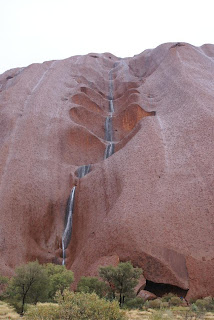 |
| Queenie and the boys with 'Possum Dreaming' |
The Red Centre is spectacular countryside, so much to see, this was so unexpected for us.. I guess we were expecting dry red barren land all around and nothing for miles...
We travelled the Red Centre Way to Uluru-Kata Tjuta National Park (460kms south-west of Alice Springs). The heavens opened up and it rained and rained and rained, so we booked a room at the motel there and headed out to Uluru for a cloudy sunset, a bottle of Moet and ginger beer, for the under 18's.
 |
| Having a champagne at Uluru |
 |
| Water running down Uluru |
 |
| all thebumps, ridges and marks on Uluru have dreamtime stories as to how they occurred |
 |
| Textures of Uluru |
The following day whilst Mumma walked around the base of Uluru, 10.6kms, silence and bliss.... the boys visited the Cultural Centre for a talk on bush tucker and learnt about which seeds you can grind into porridge and dampers. Here are some pictures from the base walk...
 |
| Base Walk - Uluru |
 |
| Men's Cave |
 |
| Cool chairs on the base walk to stop and take in Uluru |
We then all walked into Mutitjulu Waterhole (at the base of Uluru) and saw some rock art and edible plants, like bush plum and the native fig.
 |
| Mutitjulu Waterhole |
 |
| Rock art in a cave at Uluru |
 |
| some more rock art in a cave in Uluru |
For those that are interested in the dreamtime stories...
"'The Dreaming' is not a creation myth, but a myth of formation. The world existed, but was featureless. Giant semi-human beings, resembling plants or animals, rose up from the plains, carrying out tasks (camping, digging for water, fighting each other and performing ceremonies). When the heroes became tired of doing these things, Dreamtime came to an end.
Uluru is inhabited by dozens of ancesral 'beings' and the physical features at each ancestrial site on Uluru represents the activities of the ancestral being a the time of its formation and the living presence of Tjukurpa within that physical feature today. One story is that Kuniya, the woma python, lived in the rocks at Uluru where she fought the Liru, the poisonous snake.... Most of the explanations are in the realm of secret information and are not disclosed to non-Aborigines." (Source: Department of Enviornment)
We then went out to Kata Tjuta (the Olgas), for a look around...
 |
| Its so cold we are wearing jumpers and wool blankies at Kata Tjuta |
No comments:
Post a Comment